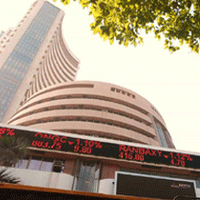The BSE Sensex fell nearly 2 per cent on Wednesday to close at its lowest in almost a year as blue chips slumped on fears of foreign investor selling after the rupee hit new lows ahead of a U.S. Fed report that may give details of its stimulus policy.
Shares failed to hold on to nearly 2 per cent gains seen earlier in the day after the Reserve Bank of India eased cash and bond holding rules for banks on Tuesday.
Analysts said the market was losing confidence in the central bank's policies as its steps to ease cash, bond holding rules on Tuesday deviated from its earlier stance of tightening rupee liquidity.
Foreign institutional investors (FIIs) have turned net sellers of shares in August, looking to extend their selling streak for the third consecutive month.
"First, the central bank needs to clarify its policy direction and second, the FIIs have not been aggressive sellers as yet and that will play out once news over QE tapering unfolds," said Sahil Kapoor, assistant vice-president of retail capital markets at Edelweiss Financial Services.
The BSE Sensex fell 1.86 per cent, or 340.13 points, to end at 17,905.91, marking its lowest close since September 11.
The Nifty fell 1.83 per cent, or 98.90 points, to end at 5,302.55 after earlier rising as much as 1.9 per cent on the RBI's steps to ease cash and bond holding rules.
Among blue chip stocks, ITC Ltd slumped 4.6 per cent while Reliance Industries Ltd fell 5.1 per cent.
Shares of IT majors fell on concerns about their valuations relative to the market and on fears that the rupee may regain some of its recent losses as it looks oversold at current levels.
Infosys Ltd fell 1.5 per cent while Tata Consultancy Services Ltd ended 1.1 per cent lower.
Most bank stocks were not able to hold on to gains made after the central bank eased cash and bond holding rules late on Tuesday.
Book value or net worth of state-owned banks would become more opaque after the Reserve Bank of India eased bond holding rules, Morgan Stanley said in a report on Tuesday.
State Bank of India Ltd fell 0.4 per cent after earlier rising as much as 6.2 per cent while Canara Bank Ltd ended 4.6 per cent lower.
Among private sector banks, ICICI Bank Ltd fell 0.1 per cent after earlier rising as much as 6 per cent, while Axis Bank Ltd ended 0.3 per cent lower after earlier rising almost 9 per cent.
However, the NSE bank share index edged up 0.5 per cent. Earlier, the index rose as much as 5.93 per cent, led by gains among banks whose bulk of lending activities are financed by wholesale deposits.
Yes Bank Ltd gained 5.1 per cent while IndusInd Bank Ltd ended 6.4 per cent higher.The rupee plunged to a record low on Wednesday on heavy dollar demand by importers and as traders fretted over mixed signals from the central bank over its efforts to prop up the currency without choking off economic growth.
Rupee tumbles
The rupee fell nearly 2 per cent to a record low of 64.54 to the dollar despite what traders said was sporadic RBI intervention in both the spot and forward markets.
Measures by the Reserve Bank of India late on Tuesday to support longer-dated credit sent prices of beaten-down bonds sharply higher but also led traders to question the central bank's resolve in defending the currency.
Since mid-July, the RBI has taken steps to tighten cash conditions, which have failed to support the rupee but sent bond yields surging, posing a fresh threat to the already cooling economy.
"Currency market and participants may consider it as a reversal of RBI liquidity tightening measures to prevent currency volatility; thus some pressure on currency may re-emerge," said Anjali Verma, economist at PhillipCapital.
With a record high current account deficit at 4.8 per cent of GDP, India is especially vulnerable to funds moving away from emerging markets in anticipation of a winding back of the U.S. Federal Reserve's stimulus programme. Traders were looking ahead for clues from Fed minutes to be released later on Wednesday.
Deutsche Bank said in a note on Wednesday that the rupee could slide to 70 in a month or so, although some revival is expected by the end of the year.
The central bank's move to ease cash conditions after tightening them last month to support the rupee highlights the growing costs to the economy of stabilising the currency.
"The bearishness seen across markets is largely a reflection of the fact that there is no quick fix solution to arrest the rupee fall," said Shakti Satapathy, fixed income strategist at AK Capital.
The yield on the benchmark 10-year bond tumbled as much as 69 basis points (bps) on Wednesday to 8.21 per cent as its price rose. It was last trading at 8.46 per cent, still down 44 bps on the day.
Local stocks turned negative, with the benchmark Sensex closing down 1.9 per cent.
Higher borrowing costs
Bond yields had risen 135 bps as of Tuesday's close since the RBI first started tightening market cash conditions in mid-July by raising short-term rates to keep rupee speculators at bay.
Still, the rupee is down 7 per cent since then.
The RBI said late on Tuesday it will buy 80 billion rupees of bonds on Friday and will pare down its cash management bill sales as its target of pushing up the overnight rate to the central bank's emergency funding rate of 10.25 per cent had been achieved.
The RBI relaxed rules on mandatory bond holdings for banks, known as the statutory liquidity ratio, which will help protect lenders from large mark-to-market losses.
While banks had previously been asked to cut their hold-to-maturity bond holdings gradually to 23 per cent of deposits, the RBI on Tuesday allowed banks to retain them at 24.5 per cent of deposits.
Rupee headed to 70/USD
The rupee could touch 70 against the U.S. dollar in a month or so, although some revival is expected in the currency by the end of the year, Deutsche Bank said in a report on Wednesday.
"We continue to believe that fundamentally the rupee is undervalued and has overshot its equilibrium level substantially, but as numerous episodes of past currency crises have amply demonstrated, under a scenario of deep pessimism, currencies can overshoot substantially and remain so for a long time," economists at the bank wrote in the report.
"India, we fear, is entering such a zone".
The partially convertible rupee dropped to a record low of 64.52 per dollar on Wednesday.





